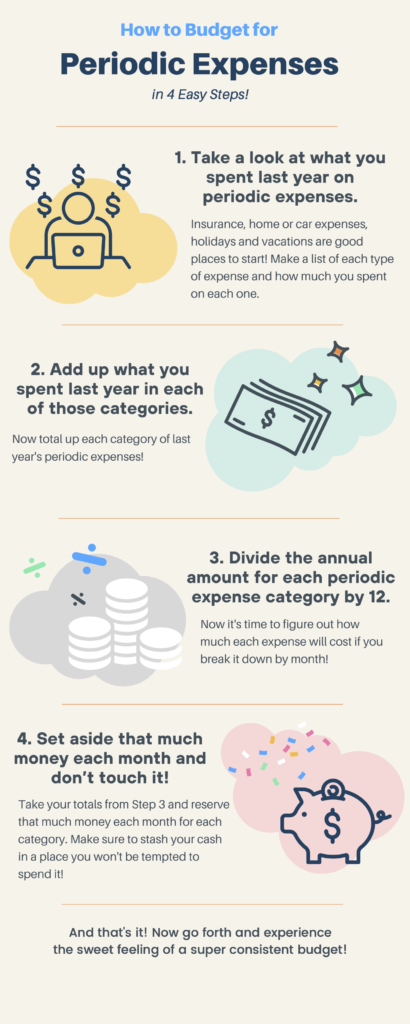Have you ever made a budget that looks amazing on paper, but when it comes to real life, it’s messier than a Monet (and not in a good way)? If so, there’s a good chance you’re forgetting to budget for periodic expenses.
We all have infrequent but regular expenses that can catch us off guard. When they do, we often find ourselves in the all-too-familiar “robbing Peter to pay Paul” scenario, and our budget goes down the toilet.
But instead of going on the defensive when one of these expenses comes along, we can choose to plan ahead and go on the offense. And the best news is that this common budgeting problem is super easy to fix.
Related: The 6 Biggest Money Mishaps a Budget Can Help You Avoid
What Are Periodic Expenses?
Unlike fixed and variable expenses that come up every month, periodic expenses are costs that come up less often than monthly. They might be due annually or a few times a year. Or they might not even come at regular intervals at all.
Some come in predictable amounts, like your semi-annual property taxes, while others have variable costs.
Why are periodic expenses such a pain? Well, aside from being just one more expense (boo!), periodic expenses happen at time periods outside the confines of your monthly budget. Now, odds are that you’ve put some serious legwork into creating and following that budget. But one large periodic expense can send you right back to financial square one.
No matter when or how much your periodic expenses are, keeping them in mind when planning your budget will dramatically increase your odds of budgeting success.
Let’s Look at Some Examples
If you want to effectively tackle your periodic expenses, it’s important to get a handle on them before they’re due. To get started, brainstorm and write down all your periodic expenses. Here’s a list of some fixed, regular costs to get your wheels turning. Each of these costs come up less frequently than monthly and are of a predictable amount.
- Life Insurance Premiums
- Car Registration
- Magazine Subscriptions
- Annual Subscriptions (e.g. delivery services or software subscriptions)
- Car Insurance
- Property Taxes
- Club Dues or Association Fees
- Domain Registration Renewals
- Tuition
This isn’t a complete list, so be sure to brainstorm all of your expenses that you don’t pay every month.
It’s also important to consider your variable periodic expenses. These are expenses that you know you’ll face at some point, but don’t come with a fixed cost. Here’s a few examples to get you started:
- Car Maintenance
- Medical Expenses
- Christmas
- Vacation
- Home Maintenance
Of course, you probably can’t predict the next time you’ll need car repairs (or how much these repairs will be), but if you own a car, you can be sure that at some point you’ll be paying for maintenance.
Christmas, on the other hand, is totally predictable. Christmas costs are condensed into one or two months of the year and can be significant. But they don’t have to ruin your budget every November and December.
We’ll talk about how you can easily plan for all of these costs in a sec. But first, let’s talk about why periodic expenses can be such a pain.
Why Your Budget Keeps Failing
When you create a budget, you naturally start by recording your income and expenses. After listing out your monthly income, you move on to your monthly payments. Adding up your monthly payments is pretty straightforward. It’s hard to forget the bills you’re continually paying (no matter how much you may want to)!
Next, subtract your monthly expenses from your total monthly income. So far, so good. You have money left over, and you seem to be living within your means. Boom! Budgeted.
As the month plays out though, you realize that your Amazon Prime membership is up for renewal. Whoops! Forgot about that one. Then your mechanic tells you that not only does your car need new brakes, it also needs a timing belt, and you may as well replace the water pump while he’s working on that. That month, your budget goes out the window.
If you have a lot of cushion in your budget, then maybe you have the flexibility to cover these types of nasty surprises. But if you’re like most of us, you don’t have that kind of flexibility.
Hello periodic expenses!
Related: Why Venmo Is Disrupting Your Budget
You can easily see the problem: because less frequent expenses don’t fit in your monthly budget, looking at your list of monthly expenses is deceiving.
You can also probably see that budgeting for periodic expenses is key to budgeting success. Awesome news: fixing this problem is pretty dang easy.
How to Budget for Periodic Expenses
Look: periodic expenses are real expenses, not a series of flukes that keep derailing your perfect budget. Making this realization allows you to budget for them successfully.The best way to pay for these big expenses? Spread their cost out over time. Here’s how to set yourself up for success:
- Take a look at what you spent last year on periodic expenses. Going through the examples above is a good jumping off point. Write down all the periodic expenses on our list that apply to you, and add any others you’re likely to face as well. Then create a category in your budget for each of these periodic expenses.
- Add up what you spent last year in each of those categories. These numbers might shock you! They’re big enough to bust your budget month after month, after all. Now imagine how amazing you’ll feel if you’ve saved up for these expenses ahead of time!
- Divide the annual amount for each periodic expense category by 12. For example, if last year you spent $1,500 on holiday expenses, you’ll need to set aside $125 each month this year. Add that amount as a monthly line in your budget.
- Set aside that money in the corresponding category each month, and don’t touch it! Whether you’re budgeting with cash envelopes or using a spreadsheet or an app, be sure that the funds for each periodic expense category are kept safe from accidental spending.
Now when those nasty little periodic expenses show up, you can kick back and relax, knowing that you already have the money on hand!
No More Dreading Large Expected Annual Expenses
Before we started to budget like this, I used to dread November’s budget. Not only is it typically a more expensive month because of the holidays, but it’s also when our annual life insurance premiums are due. Since we never saved up for either of these significant expenses, they had to come from our regular monthly spending categories, which meant that money was always tight in November.
Our family spends $810 each year on life insurance. Divided over 12 months, that’s $67. If we set aside $67 each month, we have $810 in November to pay our life insurance premiums. It’s much less daunting to save $67 a month than to come up with the entire sum in one month’s budget.
We do the same with the money we spend during the holiday season. By taking the amount that we usually spend on Christmas and dividing it out over the year, we aren’t financially strained during the most wonderful time of the year.
Even if you face a periodic expense and don’t have the full amount saved, you’ll be so much better off with something saved than if you’d set aside nothing at all!
Read: Do More, Not Less With a Budget
Benefits of Budgeting Periodic Expenses
Budgeting for periodic expenses takes some forethought, but it comes with lots of valuable benefits! Here are a few of my favorites:
Less stress
Imagine getting a car repair estimate and already having the money available without having to even touch your Imagine getting a car repair estimate and already having the money available to do the repairs! Instead of panicking about destroying your budget or depleting your emergency fund, you can calmly handle what could be a super stressful situation.
Spread costs out over time
No one likes a big “surprise” expense showing up (it’s not a birthday party, after all). Spreading high costs over time makes it so they don’t drastically affect your monthly bottom line.
Know true expenses
Focusing on the obvious monthly expenses doesn’t give you a good picture of your real financial situation. Trying tAs we said before, focusing only on your regular monthly bills doesn’t give you an accurate picture of your real financial situation. Making decisions based on this inaccurate information is super frustrating! When you base your budget on your actual expenses (not just your monthly ones), you’ll have a steady, reliable budget that continually works.
You Can Do This
Listen: budgeting is work. You’ve performed a lot of effort (and a lot of math!) to figure out and follow it. Don’t let periodic expenses catch you off guard, and derail all that awesome work! Plan these real expenses into your regular monthly budget, and sticking to a budget will become a million times easier.
Want to learn more?
If you’re ready to level up your financial life, even more, you should check out our comprehensive personal finance course, Qube Masters. Our 5-minute lessons will help you discover your genuine purpose for money, the easiest ways to create and stick to a spending plan, and simple steps for building generational wealth. Click here to learn more and sign up today!







![Everything You Need to Know About the Cash Envelope System [+ Sample Budget]](https://blog.qubemoney.com/wp-content/uploads/2020/01/1-20-20-the-cash-envelope-system-blog2-440x264.png)

